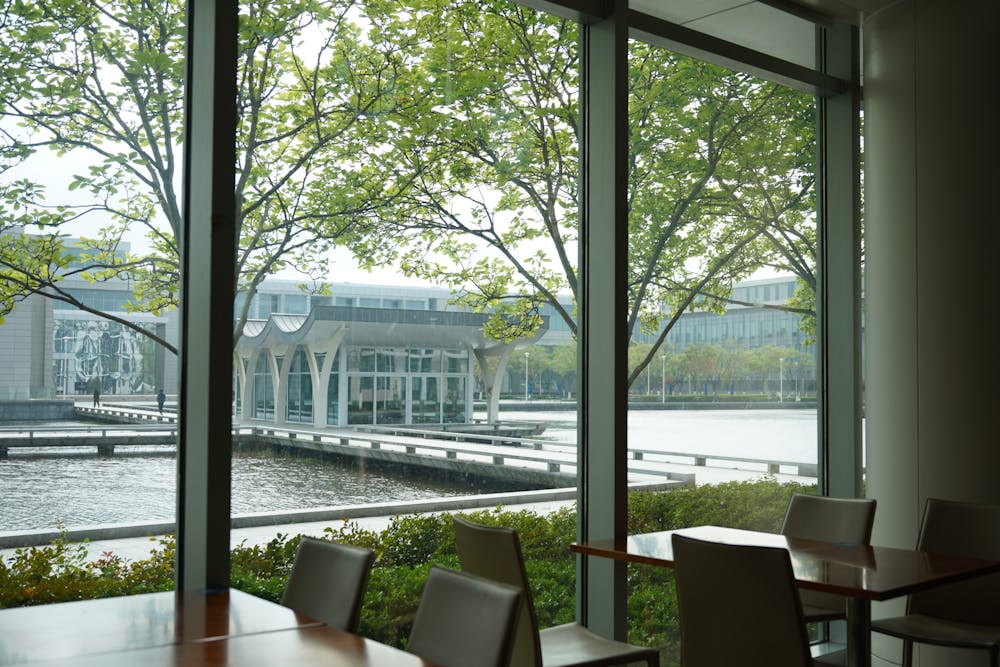Duke Kunshan University recently released its first sustainability report, assessing various sustainability indicators for how the university is performing and prescribing recommendations for future progress.
Created by students in the Sustainable DKU student club, the report was unveiled at the Duke International Forum on Nov. 17.
First held in 2015, the forum brings together policymakers, business executives, investors and researchers from around the world to discuss challenges and possible solutions associated with pressing global issues. This year’s iteration was centered around climate and sustainability, with a special focus on fostering cooperation between the United States and China on major climate issues and working toward a clean energy transition.
Writing in the report’s foreword, Scott MacEachern, vice-chancellor for academic affairs at DKU, praised the report’s “granular detail,” calling it a “major understanding of how DKU functions in this vital area.”
“The data and the stories in this report reflect our commitment to transparency, accountability and continuous improvement, and it will also serve as a benchmark for measuring our progress in years to come,” MacEachern wrote.
The club formed in 2020 as a way to promote sustainable living, education and environmental action on campus. Since then, they have organized a number of sustainability initiatives on campus, including speaker events, Earth Day festivities, film screenings, eco-friendly craft workshops and more.
Members of the club and DKU administration officials expressed their hopes that the report will continue as a series of annual updates to DKU’s sustainability goals.
The report is divided into five major themes: energy, water, waste, food and air quality. Students used the UN Sustainable Development Goals and the climate targets established in 2015 at The Paris Agreement as benchmarks for measuring DKU’s current sustainability initiatives.
Students noted several positive takeaways from the state of campus operations. DKU has earned several Leadership in Energy and Environmental Design (LEED) certifications for energy-efficiency measures, and the university’s per-capita energy use is less than that of its home province of Jiangsu. Additionally, DKU’s water management practices incorporate multiple LEED-certified appliances and feature a near-circular harvesting system.
The report centered on three recommendations for the university’s administration. First, it advocated for the setting of campus-wide sustainability goals similar to Duke’s net-zero climate targets.
Duke is currently set to achieve carbon neutrality in 2024, as the University expects to reach 45% emissions reduction by the end of the year and compensate for the remaining 55% with carbon offsets. However, DKU’s campus is not included in current emission-tracking metrics and therefore does not factor into the Climate Commitment’s net-zero carbon goals.
Senior Aisha Shen, project director at Sustainable DKU, hopes that DKU will conduct a full carbon audit, then set long-term goals to attain carbon neutrality based on its results.
Another shortcoming was the state of available data for measuring sustainability efforts on campus. Students involved in the report’s creation noted that data on important metrics like water quality and waste sorting practice was often inconsistent or incomplete, which hindered their ability to provide a comprehensive analysis and make decisions on future sustainability efforts.
The final recommendation made by the report’s authors was to establish an office to coordinate sustainability initiatives at DKU, similar to Duke’s Office of Climate and Sustainability. Students spoke with Tavey Capps, executive director of climate and sustainability at the OCS, while she visited campus as part of Duke’s climate delegation to the Duke International Forum in November.
Capps, who has provided support throughout the process from her position at Duke, said that DKU’s administration is currently engaged in internal discussions about the prospect of creating an office focused on climate and sustainability at DKU.
“I think the ambition of the Climate Commitment is really to infuse climate and sustainability across all aspects of Duke’s mission, and seeing how this connects to DKU and their climate and sustainability efforts was really one of the most exciting outcomes of our trip to China for me. I’m excited to see how the partnership grows in the future,” Capps said.
Get The Chronicle straight to your inbox
Sign up for our weekly newsletter. Cancel at any time.

Zoe Kolenovsky is a Trinity junior and news editor of The Chronicle's 120th volume.

